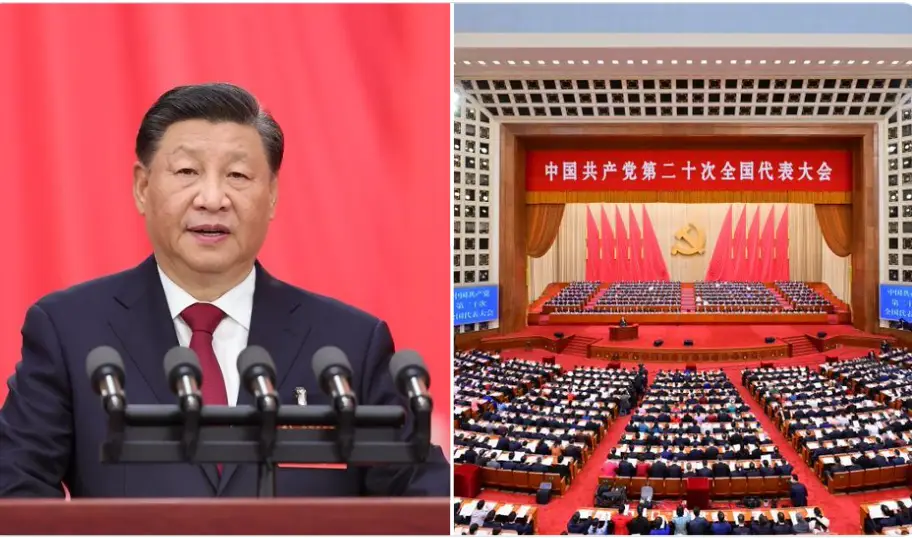China began its once in five years Party congress which will pick a new leadership line-up, record “achievements” of the past half a decade and work towards a roadmap till 2027 if not beyond.
The event is significant as Chinese President Xi Jinping is expected to further strengthen his hold on the party- state for a third term, signal concrete strategies to counter headwinds facing China—the economic turbulence following draconian Covid-19 crackdowns, food and energy security after the Ukraine war and growing confrontation with the West, especially the United States.
For India, the 20th Party congress can be pivotal in determining the Chinese position along the Line of Actual Control (LAC), especially when China is likely to be preoccupied with Taiwan, and may not want its troops to be engaged on multiple fronts. President Xi is expected to visit host India at the Shanghai Cooperation Organisation summit slated for June 2023. India will also be hosting the G-20 summit next year where the Chinese leader will also be invited.
During his address, which lasted one hour and 45 minutes, Xi emphasised bolstering national security in all dimensions—military, energy, food and supply chain security. This was necessary to fulfil PRC’s two centenary goals—removing extreme poverty by 2021 which has already been achieved and pursuing the “Chinese Dream” of making China an unrivalled global power apexing all dimensions of human endeavour, including military, economy and culture.
#XiJinping delivers report to 20th National Congress of Communist Party of China, #CPC on behalf of the 19th CPC Central Committee as 20th party congress begins in Beijing. pic.twitter.com/saQM3VXcLl pic.twitter.com/hex63ooiaT
— All India Radio News (@airnewsalerts) October 16, 2022
During his speech Xi made five key points focused on fostering comprehensive security.
First, Xi rejected Taiwan’s independence and said he would be ready to use force to prevent that from happening. However, he was ambiguous about military intervention if the Taiwanese leadership showed an intent not to pursue the path of independence. “We will not renounce the use of force and will take all necessary measures to stop all separatist movements.” Amid applause Xi said the party must stand firm on its strategy to resolve the Taiwan issue and be determined to reunify the nation. But he also said that the party will always “respect, care and work to benefit compatriots in Taiwan” with economic and cultural exchanges.
Rejecting foreign intervention, a veiled reference to the United States and its allies, the Chinese President said, “The resolution of the Taiwan issue is a matter for the Chinese people themselves, to be decided by the Chinese people.”
Second, Xi stressed that China must modernise its national security system as this was the key to ensure social stability.
“National security is the foundation of national rejuvenation, and social stability is a prerequisite of national strength,” he observed.
“We must unswervingly implement the comprehensive national security concept, maintain national security throughout all aspects of the work of the party and the state to ensure national security and social stability.”
Unsurprisingly, he said that China must beef up its capacity to safeguard food, energy, key industrial and supply chain security.
Third, regarding military security, Xi stressed military modernisation to be brought about by better equipment, greater use of technology and enhancement of strategic capability, a veiled reference to nuclear weapons.
Significantly, he called for deeper control of the Party over the military.
Fourth, with the Covid-19 pandemic in the backdrop, Xi promised to revamp the public health system, which can better respond to epidemics and infectious diseases.
He also addressed the problem of an ageing population by advocating a new pro-natal policy.
Finally, Xi called for Sinicising religion, referring to a 2015 campaign to bring religions that do not have traditional roots in China under the control of the party , and align them with national mainstream culture.
The reiteration to Sinicise could sharpen the under-the-radar tussle with India over the global stewardship of Buddhism, which China has shown signs of appropriating. It could also have a bearing on Tibet and the role of the Dalai Lama, who currently resides in India.
At the end 20 th Party Congress a 300 strong Central committee of the Communist Party of China will be “elected”. From its ranks a powerful 25- member Politburo will be skimmed. Finally, the Congress will pick a 7-9 member standing committee of the Politburo which will provide leadership to the People’s Republic of China (PRC) for the next 5 years with Xi Jinping as the helm. Xi is expected to hold the three most powerful levers of Party State—control of the party as its General Secretary, head of the Central Military Commission that will steer the People’s Liberation Army and the more ceremonial post of President of the PRC. There are rumours that Xi may be declared “Chairman” of the Party, symbolically elevating him at par with the party-State’s founder Mao Zedong.
State broadcaster CCTV showed Xi’s predecessor Hu Jintao and current Politburo Standing Committee members Li Keqiang, Wang Yang, Zhao Leji, Li Zhanshu, Wang Huning and Han Zheng, seated in the front row with Xi.
Also Read: Why Xi Jinping’s iron grip will only tighten during the upcoming 20th Party congress in China




















